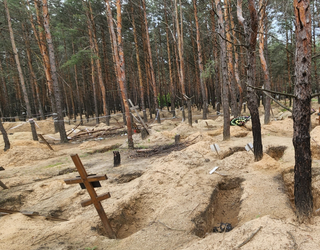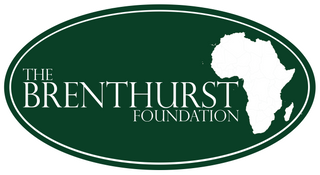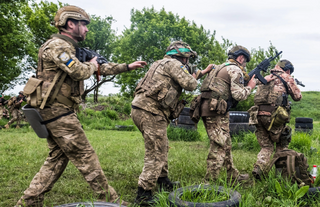News
Ukrainians Believe South Africa is Not Neutral and is ‘Squandering its Moral Capital’
While no one in Kyiv’s government is impolite enough to turn down a diplomatic foray, no matter how misguided it may be, there are grave doubts about the chances of its success. Oleksandr Merezkho, the chair of the foreign relations committee in the Ukrainian parliament believes there should be 'no more Munichs', referring to attempts to appease Nazi Germany in 1938 by carving off parts of Czechoslovakia.


Kyiv’s air-raid sirens sounded for the third time in eight hours at 10.15 this morning. During the night, Ukrainian defences shot down 10 Iskander cruise and ballistic missiles. Still, three people were killed by falling debris, including one 11-year-old child. This was on 1 June 2023, International Children’s Day.
The last month’s incessant Russian missile and drone attacks on Kyiv, Kharkiv and other cities are aimed at terrorising civilians, even though they do have some professed military purpose in stretching Ukrainian defences, using up precious Patriot missiles, spoofing systems and testing response times.
They also have a political purpose in attempting to shape the peace process, not least in scaring away foreign embassies and visitors, and trying to intimidate the two-thirds of Kyiv’s residents who have now returned to the capital since the war started on 24 February last year.
The attacks provide some substance, too, for the active disinformation measures relentlessly pursued by Moscow, focusing on how Ukraine is sucking up international resources into a “black hole”, attempting to discredit Kyiv and destabilise international support.
African peace initiative
These attacks continue on the eve of the “five plus one” African peace initiative, announced by President Cyril Ramaphosa in the middle of May, rather unusually during a press conference with the visiting Singaporean prime minister.
This initiative is to include the presidents of the Republic of Congo, Egypt, Senegal, Ivory Coast, Uganda and Zambia. The safari is due to travel to Ukraine next week and then on to Russia, reportedly to explore the grounds for peace.
While no one in Kyiv’s government is impolite enough to turn down a diplomatic foray, not least from the global south and no matter how misguided it may be, there are grave doubts about the chances of its success – not least given its timing, the political character of some of its constituents and the underlying motives. As such, there is some risk of it backfiring badly.
Peace processes to end Russia’s war on Ukraine have recently mushroomed after a year of virtual stagnation. There seem to be two reasons for this.
The first has to do with the imminent Ukrainian military counter-offensive.
Following Ukraine’s 2014 Maidan Square protests and Revolution of Dignity which resulted in the ouster of the pro-Russian president Viktor Yanukovych, Russia annexed Crimea from Ukraine and supported separatists fighting in the eastern Donbas region. The Minsk peace agreements in 2014/15 were negotiated after Ukrainian battlefield reversals.
If nothing else, Putin thus understands the need to negotiate from strength. While Russia might have 350,000 soldiers focused on Ukraine, they are stretched across a 1,300km front. Now that the current Russian campaign has basically burnt itself out in flattening the city of Bakhmut, the world keenly awaits the Ukrainian response, likely – for reasons of good weather, if nothing else – to be launched in the next fortnight.
The second reason for the peace-making flurry is to do with China and its role within the BRICS group and with Europe. The BRICS countries are among those viewed as key members of “Putin’s hidden coalition” by Ukrainian lawmakers.
China has recently stepped up its peace activism, not least through its February 12-point plan and Xi Jinping’s Global Security Initiative, and the appointment of a senior diplomat as a special envoy to Eurasia and the Ukraine crisis.
In doing so, Beijing appears to have changed tack from believing that the war would remorselessly consume US resources, to realising that Washington has instead successfully consolidated its international alliances.
The BRICS countries have provided a neat entry point given Lula’s re-election, with the Brazilian president punting his own “Crimea for peace” solution.
At the same time, Beijing has engaged with European leaders, notably President Emmanuel Macron, who paid a state visit to China in April. Earlier, in February, the Chinese ambassador to Paris caused a diplomatic kerfuffle when he questioned the sovereignty of Ukraine and other former Soviet republics.
The twin concept of a ceasefire and land for peace is a constant in the China and Brics discussions; one that has apparently now been taken up by the South African President.
Strategic about-turn
Both these reasons – the pending counter-offensive and China’s strategic about-turn – are believed to have influenced the timing of Ramaphosa’s hasty announcement; one which took the Singaporeans, among others, by surprise. Moreover, there seems to be little substance to the initiative aside from travelling from Africa to assess the situation on the ground.
For any wannabe mediators, there are three conditions for successful peace missions. Both parties have to be willing to want peace more than war, and thus to make the compromises necessary; the international community has to push all parties evenly to the negotiating table; and, there has to be credibility on the part of the mediators and negotiators, clear method and judicious timing.
The African peace mission has, from the outset, several related problems.
Russia is, on the basis of past actions, unlikely to be acting in good faith. If not, this is more than likely a pseudo-diplomatic attempt to muddy the West’s relationship with Kyiv and thus undermine the preparations for the Ukrainian counter-offensive.
Moreover, the upcoming offensive accentuates Putin’s imperative to appear strong. The timing of the African mission is in fact a backhanded recognition by Moscow that its invasion of Ukraine has been an unmitigated disaster. If nothing else, it has cemented Ukrainian nationalism and bolstered its international position, while adding Finland and Sweden to Nato’s membership.
Nor is Ukraine willing to make compromises that leave the Russians in control of Ukrainian territory. Neither is there uniform international pressure. And it’s doubtful that South Africa, among others in the African group, is seen as an impartial and credible mediator, not least given its ongoing exchanges with Moscow, the Lady R arms shipment controversy, the refusal to allow defensive arms sales to Poland, and Russian oligarch funding of the ANC.
‘Peacock hypocrisy’
Oleksandr Merezkho is the chair of the foreign relations committee in the Rada, the Ukrainian parliament, and a professor of international law: “We said no more Munichs”, he notes of the attempts to appease Nazi Germany in 1938 by carving off parts of Czechoslovakia.
“But now we attempt to make peace in the spirit of Munich, by appeasing the aggressor. Those that attempt to do this, do so in the name of ending conflict,” he says of South African ANC parliamentarians with whom he interacts at the inter-parliamentary union, “citing the lives of innocent children and women. But this is no more than peacock hypocrisy”.
He is outspoken on his disappointment with “the country of Mandela” which he held up once as an example of the triumph of leadership and human rights.
“We campaigned for the ANC as freedom fighters. Now they are seen as corrupt… squandering their moral capital, the one and only thing that they had.
“Ukraine is a clear case about the principle of the prohibition of the threat of the use of force. Yet the ANC’s position is cynical. Instead of answering the question as to whether Ukraine can restore its territory, it instead repeats the same empty narrative, the same empty slogans.”
Merezkho says that this war, and these choices, come at “a crucial moment in history, where there is a clear choice between freedom and tyranny”.
Any peace mission also has to spend enough time in-country speaking to leaders to understand them; something that a whistle-stop meeting in Kyiv won’t achieve. Otherwise, it’s little more than a photo opportunity.
An absence of moral and legal principles will ensure that these talks are doomed to fail; that the Africans will be no more than “useful idiots” for Putin’s cause, notes Gregory Nemyria, a member of parliament and the deputy chair of the foreign relations committee.
War crimes
The moral and legal case is at the forefront of Ukrainian debates, not least given the scale of the devastation. The joint investigation involving Nobel laureate Oleksandra Matviuchuk and the Centre for Civil Liberties has for example recorded 41,490 incidents of war crimes.
At best, the African mission will sensitise the leaders to the atrocities of Bucha, Irpin and other cities – that is if they stay long enough.
There is also a gulf between the peace terms outlined by the Russians and Ukrainians.
Ukraine’s peace terms are simply that Russia leaves. That is the easiest way for the war to end.
Ukraine will never give up its legitimate, internationally recognised borders.
Charles de Gaulle said about peace in Algeria, “In politics, it is necessary either to betray one’s country or the electorate. I prefer to betray the electorate.” This won’t work in Ukraine, given the sacrifices which have been made.
The Russian terms for peace, as enunciated by its deputy foreign minister Mikhail Galuzin on 27 May, are unacceptable to the Ukrainians, essentially because they freeze the conflict in place. They also impose conditions on Ukrainian membership in the European Union and Nato.
‘Doomed to fail’
As Nemyria argues, “The African initiative is doomed to fail because the organising principle of this initiative – a ceasefire to freeze the status quo with 20% of Ukraine’s land occupied and the idea of land for peace – is unacceptable to Ukrainians.”
Whatever the nature of external support – to end this war, and not just postpone it – the terms for peace will have to remove the Russian threat, once and for all.
A plan for peace will also have to include a plan for reconstruction and integration to provide security guarantees for the Ukrainians. This is best explained by the Ukrainian narrative that, “If Russia stops fighting, the war will end; if Ukraine stops fighting, Ukraine will end.”

Maxime Maximov worked with drug addicts in Donetsk before moving to Izyum in 2010. After the Russians gained control of the town in March 2022, he was arrested, beaten and tortured “with electricity”, and accused of being a member of Ukrainian intelligence, the SBU.
Released by the Ukrainian army on the town’s liberation in September, he says “dealing with Russia is like dealing with a drug addict. You can’t give them land in the hope that they will be satisfied.”
There is a need to rid the country not just of Putin, he says, but of what he terms “Putinism”.
Closer integration with Europe could not only help but also work both ways.
By this war’s end, Ukraine will have one of the most battle-hardened and combat-effective armies in the world, certainly in Europe.
No less a figure than Henry Kissinger, who originally pooh-poohed the Ukrainians’ chances in saying that they should be willing to cede territory to make peace with Russia, now says there is a need to use Nato inclusion as a way of restraining Ukraine. This, and European Union membership, would help to improve internal governance and regional relationships.
Bloody history
Ukraine’s struggle for statehood has been dipped in blood and horror.
Although Kyiv can trace its early settlements several hundred years before Moscow, the Russian empire has maintained a steady and brutal grip on the territory. During the 20th century, as many as five million Ukrainians were starved to death in the Holodomor in 1932/3, the famine engineered by Josef Stalin and designed to snuff out Ukrainian nationalism.
Between 1932 and 1945, more than 13 million Ukrainians died at the hands of Stalin and then the Nazis – from a population of 35 million.
About 1.7 million Ukrainians perished fighting for the Red Army against the German invaders. The eastern city of Kharkiv, like Kyiv, was the focus of major battles, the city being captured by the Nazis in October 1941. It was also the site of mass deportations, given its makeup.
Ukraine is a melting pot of five nations – Ukrainians, Russians, Poles, Tatars from Crimea and Jews. One-quarter of Kharkiv’s pre-war population of 700,000 was Jewish. By the time of the city’s liberation in August 1943, just 200,000 citizens remained. Some 80,000 died due to starvation or exposure, and an estimated 60,000 were deported to Germany.
Among them was Boris Romanchenko, a nonagenarian survivor of the Buchenwald and Belsen concentration and work camps who was killed when Russian fire hit his Kharkiv apartment in March 2022. The Saltivka area of Kharkiv was on the route of the Russian advance, and its apartment blocks and housing were subject to random shelling and missile attacks. The Ukrainian foreign minister Dmytro Kuleba commented on his death: “Unspeakable crime. Survived Hitler, murdered by Putin.”
The Jewish character of Kharkiv, Odesa and Dnipro makes nonsense, of course, of Russian claims at a denazification exercise as much as its special military operation is supposedly not an invasion.
Ukraine’s September 2022 counteroffensive liberated much of the Kharkiv oblast, but Moscow has kept up its relentless targeting of the city with airstrikes.
With the Russian border just 30km away, you hear the boom before the air-raid siren has time to wind itself up. More than 6,500 houses have been damaged, 500 multi-story residential buildings so badly wrecked they cannot be rebuilt, and 80 hospitals and clinics damaged along with cultural institutions, museums, universities and subways.
From a Ukrainian perspective, backed by international law, negotiations cannot trade land for peace.
As Constantine Petrov, the secretary of Izyum municipality, liberated in September from Russian control, puts it, “While we may struggle for economic advantage or for technology, we should not be, in the 21st century, fighting for our existence.”
“This war is not about territory,” says former prime minister Yulia Tymoshenko.
“For Ukraine, it is to be, or not to be. It is existential. Anything built on land for peace will not work here. It will not stop Putin. He wants to exterminate Ukrainians.”
This article originally appeared on the Daily Maverick
Photo: Greg Mills


